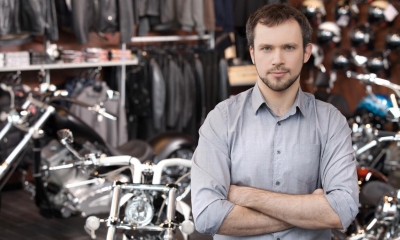
The following is an overview of legislation that might be of particular relevance to your business. The list is not intended to be exhaustive.
What licences does a motorcycle dealer need?
You should be aware of the following:
- you will need authorisation from the Driver and Vehicle Standards Agency (DVSA) if MOT testing is to be offered. This covers premises, testing equipment, and the person carrying out the tests. Note that in Northern Ireland, MOT testing is carried out exclusively by the Driver and Vehicle Agency and can't be done by private businesses
- a certificate is required from the local petroleum enforcement authority for a non-retail filling station (ie, if you have petrol storage tanks from which petrol is mechanically or electrically dispensed, for example for filling the tanks of new motorcycles once they have been sold or adding fuel to machines that have come in for service or repair). If you just store petrol in jerry cans or other approved containers then it's unlikely that you'll need a certificate. You should contact your local authority for details
- you will need consumer credit authorisation from the Financial Conduct Authority (FCA) if credit terms are offered to customers
- if you handle - or are prepared to handle - transactions of more than 10,000 euros in cash (or equivalent in any currency) you must register with HM Revenue & Customs (HMRC) as a high value dealer and put in place anti-money laundering systems
- local authorities in Scotland require second-hand dealers - including motorcycle dealers - to obtain a licence or registration to operate. This applies unless dealing in second-hand goods is only incidental to the main business activity. Elsewhere in the UK, some local authorities license or register businesses where second-hand dealing is the main or a significant part of the business and is not just incidental. However, certain specific exemptions generally apply - these typically include motor vehicle dealers. Businesses which hold consumer credit authorisation are normally also exempt. If you are in any doubt as to whether second-hand dealer licensing may apply to your business, contact your local authority trading standards department for guidance
- all vehicle number plate suppliers are required by law to register with the DVLA. You can find out more about registering on the Gov.uk website
- if you want to ride unregistered and/or untaxed motorcycles which are temporarily in your possession, then you will need trade licence plates ('trade plates') from the DVLA. You are only permitted to ride on trade plates for certain purposes - for example test drives, deliveries, and taking a motorcycle to another motor trader's premises. Note that trade plates only exempt you from the need to tax a motorcycle - they don't exempt it from MOT testing requirements (where these are applicable) or the need to be properly insured. However, by registering your trade plates with the Motor Insurance Database then the relevant authorities will be able to see that you have an appropriate motor trader's insurance policy in place to cover you. Trade licence plates are valid for a period of between six and 12 months, after which you'll need to renew them if you still need them. A fee is due for applications and renewals. You can find out more and apply for trade licence plates on the Gov.uk website
- any premises in Wales which produces 500kg or more of hazardous waste in any 12 month period needs to be registered with Natural Resources Wales. Even if you don't generate that quantity of hazardous waste, you may find it useful to register anyway as this can simplify the disposal process
- under pollution control legislation, businesses that engage in certain industrial processes require a permit from their local authority environmental health department. Regulated processes include paint refinishing
- if you play background music anywhere in your premises - including the showroom area and the workshop - you'll usually need a Music Licence from PPL PRS Ltd. There is an annual fee for this which you can pay online on the PPL PRS website
- if you sell, advise on, arrange or assist in selling general insuranc, you may need to be either directly regulated by the FCA or become an appointed representative of an FCA authorised prinicipal insurer, even if insurance is only a small part of your business. This includes insurance backed warranties. Contact the FCA for further information
Rider legislation
You should be aware of the current rider legislation so that you can advise your customers which machines they can legally ride, including those fitted with restrictor kits.
Rider legislation in Great Britain changed from 19 January 2013, with the main differences being amendments to moped licensing and a rise in the minimum age for Direct Access from 21 to 24.
In 2016 the Driver and Vehicle Standards Agency issued new moped and motorcycle rules setting out the age and qualification requirements for riding different types of motorcycles. You can find flowcharts allowing the easy application of the rules on the Gov.uk website.
Storing petrol
The Dangerous Substances and Explosive Atmospheres Regulations (DSEAR) require you to identify the dangerous substances in your workplace and put in place measures to either remove or control the risks from them.
Although the petroleum legislation requires petrol filling stations (including non-retail ones) to hold a petroleum storage certificate, if you're only planning to store petrol in jerry cans or similar containers it's unlikely that you'll need one.
Substances that could be used to make explosives
There are special regulations in place to prevent substances that could potentially be used to make explosives getting into the wrong hands. Some substances, which would normally only be available from specialist suppliers, are regulated and can only be supplied to a member of the public who has a licence to obtain and possess them. Other substances, although not regulated, are nevertheless of potential concern. Examples of these, which are referred to as 'reportable substances', include sulphuric acid (supplied for use in motorcycle batteries) and the solvent acetone.
You should report any suspicious transactions (or disappearances due to theft) involving regulated or reportable substances to the police Anti-terrorist Hotline on 0800 789 321. A transaction could be suspicious for various reasons, for example because the customer insists on paying cash and/or wants an unusually large quantity of a product containing a reportable substance.
There's more information for businesses about regulated and reportable substances on the Gov.uk website.
Money laundering
The Money Laundering Regulations apply to high value dealers that accept or make cash payments of 10,000 euros or more (or the equivalent in any currency) for any transaction. If you handle transactions of this size you must register with HM Revenue & Customs (HMRC) and put in place anti-money laundering systems.
Retailing
There is a wide range of legislation that applies to retail outlets and that protects the interests of the consumer. For example, goods and services must not be misleadingly described and the retail price of goods must be clearly displayed. You will be responsible for making sure that all goods or services are fit for their intended purpose and of satisfactory quality. The Business Companion website includes detailed guidance on all aspects of trading standards legislation.
Under regulations which cover customer disputes and resolution, you'll need to be able to give your customers details of a certified 'alternative dispute resolution' provider for your industry sector. And you'll need to inform them about whether or not you intend to use that provider in the event of a dispute.
Carrier bag charge
A minimum 10p charge applies for single-use carrier bags in England (other rules apply in Wales, Scotland and Northern Ireland). You can get detailed guidance from the GOV.UK website.
Health & safety, fire
You must also make sure that you comply with workplace health and safety and fire safety legislation.
Employment legislation
Anyone employing staff must comply with employment legislation. Important areas of legislation include:
Recruitment and employment contracts
Working time: hours, leave, flexible working
Maternity, paternity and adoption
Managing home workers, remote workers, lone workers
Industry support
The National Motorcycle Dealers Association, part of the Retail Motor Industry Federation (RMIF), offers advice and support to its members on employment and consumer law as well as health and safety matters.
Insurance for a motorcycle dealer
When you start up in business you will need insurance cover. Contact an insurer and explain to him or her exactly how your business will operate - they will then recommend what cover you should have. This might include:
- premises, premises contents and stock
- goods in transit (being collected or delivered)
- cash
- business interruption
- employer's liability
- public liability
- product liability
- motor insurance (for delivery vehicles)
The National Motorcycle Dealers Association, part of the Retail Motor Industry Federation (RMIF), offers special insurance schemes for motorcycle retailers and preferential rates for its members.



